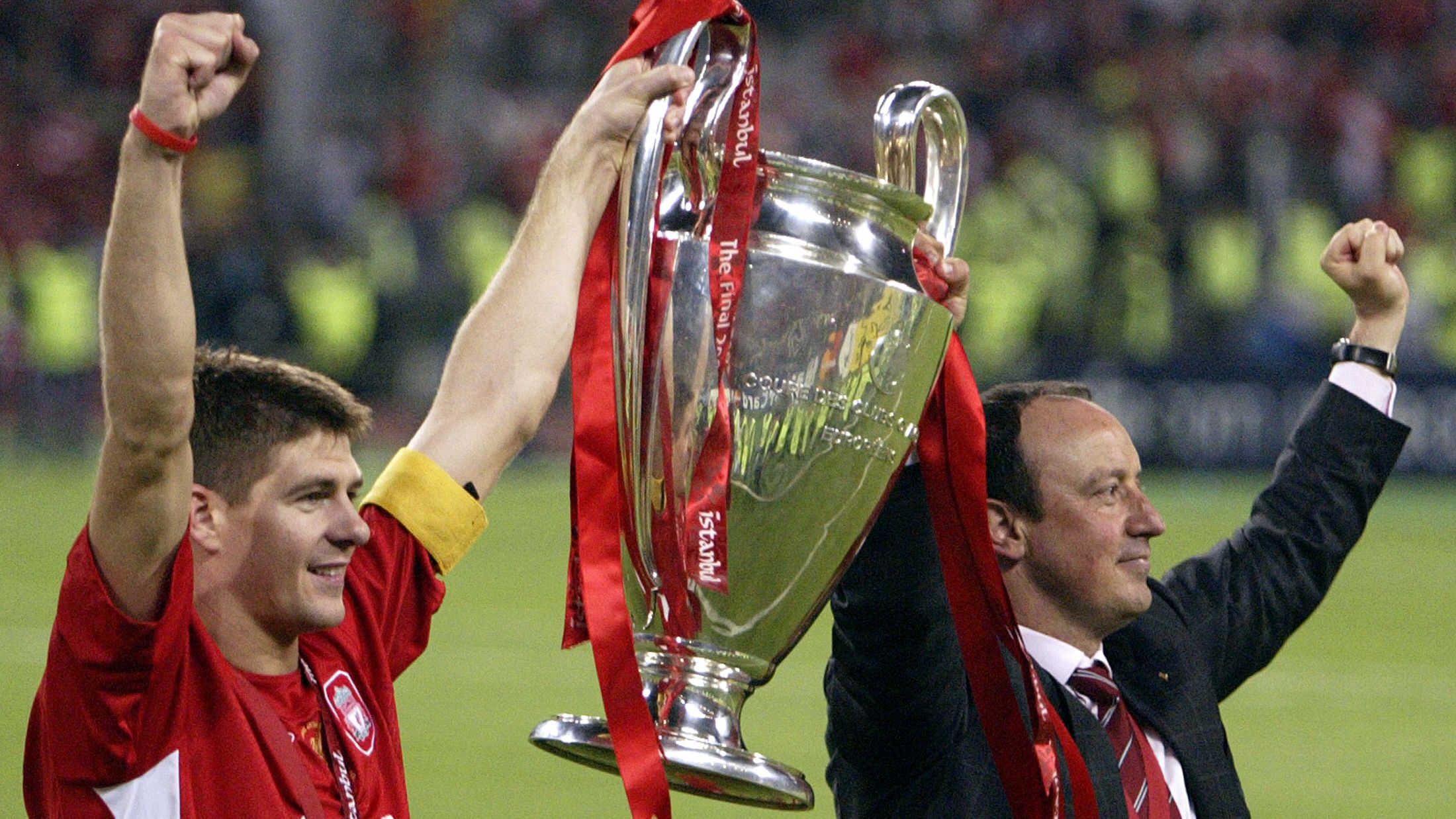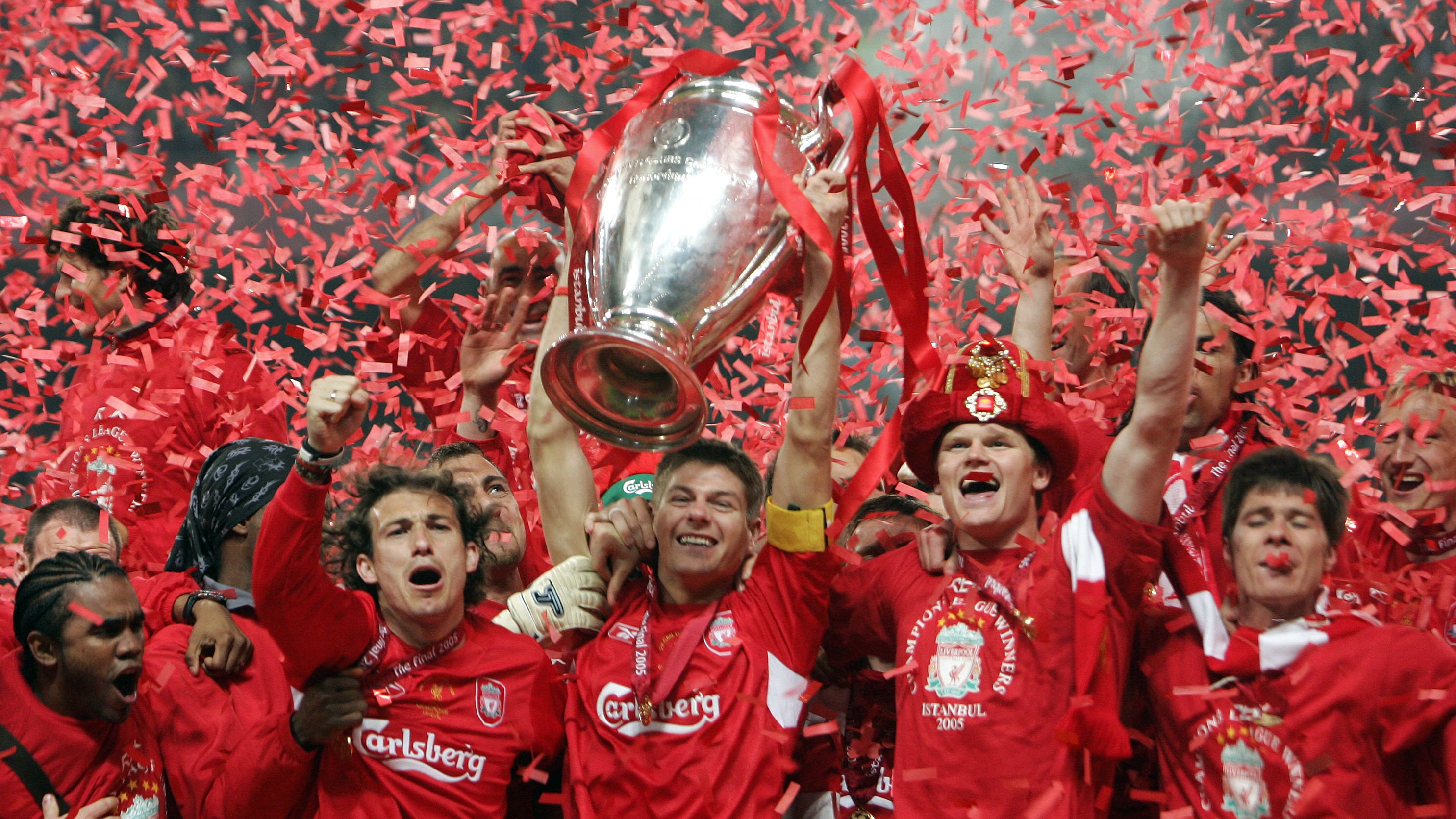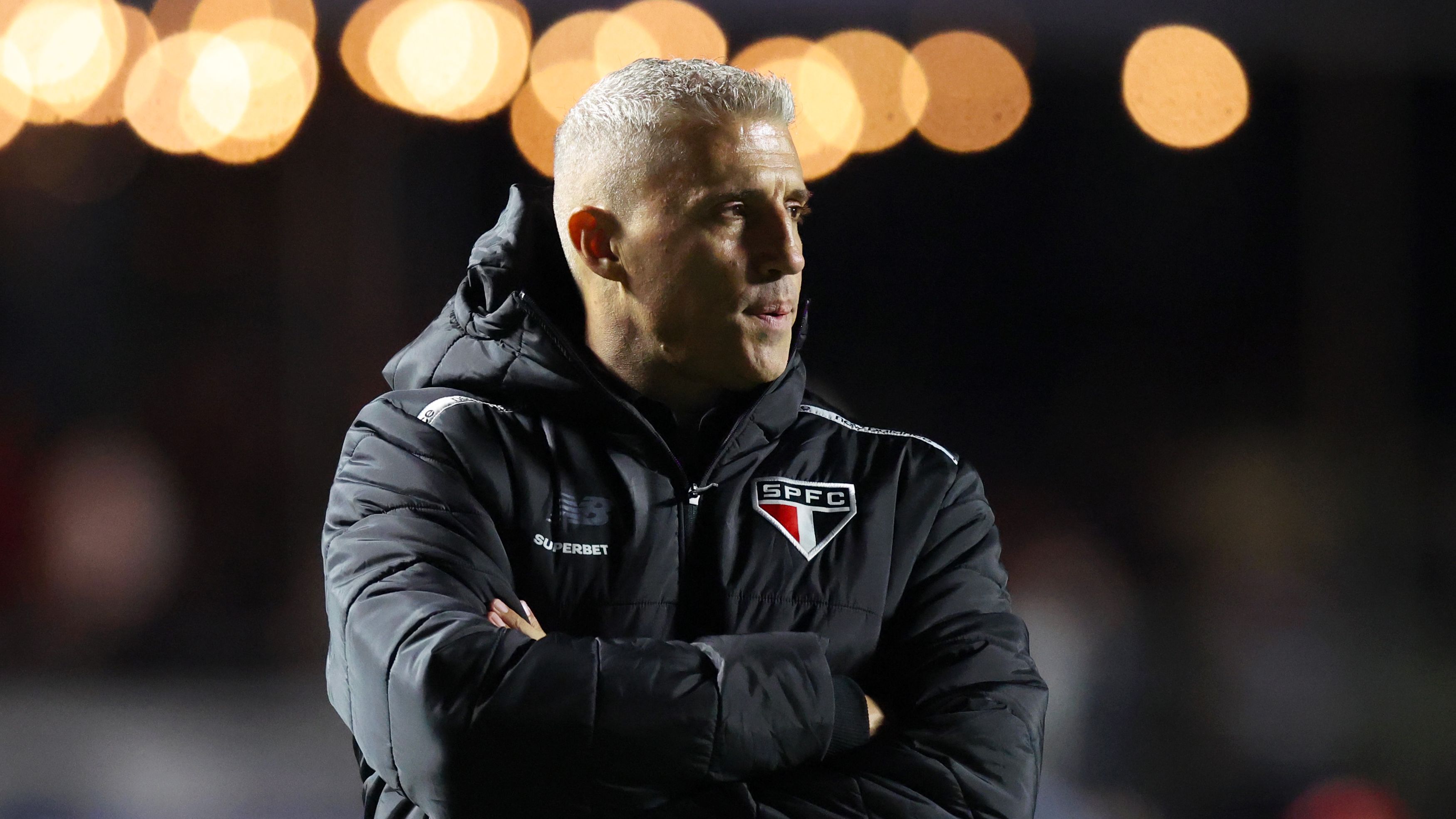


Echoes of Istanbul: Crespo’s Unresolved 2005 Champions League Heartache
In a revealing discussion, the former Hernan Crespo, once a dominant force in European football, opens up about the lingering sting of AC Milan’s shocking loss in the 2005 Champions League final against Liverpool, labeling it a persistent burden that shadowed his illustrious years on the pitch. At 50, he shared these thoughts in an in-depth conversation with the Italian publication Gazzetta dello Sport, delving into the setbacks that marked his otherwise triumphant journey.
Crespo’s Reflections on the Iconic 2005 Final
This matchup stands as one of the most thrilling climaxes in Champions League lore, where Crespo played a pivotal role early on. AC Milan surged ahead with a commanding 3-0 advantage at halftime in the Ataturk Olympic Stadium, kickstarted by Paolo Maldini’s early strike, followed swiftly by Crespo’s precise pair of goals in the 39th and 44th minutes. Yet, the tide turned dramatically in a mere six minutes of the second half, as Liverpool fought back with goals from Steven Gerrard, Vladimir Smicer, and Xabi Alonso to tie the game, ultimately clinching a 3-2 victory in the penalty shootout. While this defeat has become legendary for supporters, it remains a profound source of dismay for the Argentine star.
His Deepest Career Regret
When pressed on his greatest professional letdown, Crespo candidly shared: “The 2005 Champions League showdown in Istanbul between AC Milan and Liverpool haunts me. Following Maldini’s opener, I netted two goals myself, leaving us up 3-0 at the break, only for the opposition to mount a stunning recovery and edge us out on penalties. Swallowing a loss like that after such a strong performance is tough… I avoided revisiting that game for years. It’s only lately that I’ve come to terms with this frustrating chapter, but let’s not linger, or I’ll feel that frustration anew.”
Insights on Rising Stars and National Records
Known for his 35 goals across 64 outings for Argentina, Crespo also touched on the shift in his country’s scoring hierarchy, particularly with Inter’s captain Lautaro Martinez poised to surpass him. Martinez currently matches Crespo’s tally but is on track to claim the fourth position, trailing only Sergio Aguero, Gabriel Batistuta, and Lionel Messi.
Praising Martinez’s Prowess
“Martinez is a well-rounded forward who’s demonstrated his capabilities time and again at Inter and for the national team,” Crespo remarked. “He’s exceptionally sharp in front of goal and has an uncanny ability to spot opportunities that elude most. He excels in collective play, maintains strong links with his squad, aggressively pursues open areas, and handles the ball adeptly. In short, he’s a true standout. His confidence makes rival defenders wary, often leading to double coverage-a clear sign of his peak development.”
World Cup Aspirations and Unfulfilled Dreams
Even with an outstanding club record at teams like Parma, Lazio, Inter, and Chelsea, Crespo has expressed that not capturing a World Cup with Argentina’s gifted squad weighs heavily on him. Sharing the field with legends such as Batistuta, Juan Sebastian Veron, and Diego Simeone, his international efforts concluded with quarterfinal setbacks in 1998 and 2006, plus an early exit in the group phase of 2002.
The Elusive World Cup Glory
“From the outset of my career, the World Cup was my ultimate pursuit; our era grew up idolizing Maradona’s triumph in 1986,” he noted. “We aspired to recreate that enchantment for Argentinians, yet we fell short. This unachieved goal remains a constant in my thoughts.”
A Legacy of Scoring Excellence and Beyond
Over his remarkable tenure, Crespo solidified his status as a formidable attacker in Europe, amassing 248 goals over 540 club matches. He shone brightest in Italy, with 153 strikes in 340 Serie A appearances for powerhouse clubs including Parma, Inter, and Lazio. His standout period came at Parma, where he tallied 94 goals in various tournaments. He also made his mark in the Premier League, scoring 20 times in 49 games for Chelsea, and proved a reliable menace in the Champions League with 25 goals from 65 games. Internationally, his contributions for Argentina further entrenched his reputation as an elite striker, and he’s now channeling that experience into his coaching path.
Current Role and Future Coaching Goals
Currently at the helm of Sao Paulo in Brazil, Crespo harbors hopes of returning to Italy for a managerial position. He draws inspiration from figures like Carlo Ancelotti, Jose Mourinho, and Marcelo Bielsa, viewing a Serie A opportunity as the perfect capstone to his football narrative.
“Leading a team in Europe, especially in Italy, feels like completing the full cycle,” Crespo expressed. “We’ll see what unfolds without rushing. For now, my focus is on Sao Paulo.”
The Match That Defined an Era
Key Moments from the 2005 Champions League Final
The 2005 UEFA Champions League final between AC Milan and Liverpool stands as one of the most dramatic spectacles in football history, forever etched in the minds of fans as the “Miracle of Istanbul.” Picture this: AC Milan took a commanding 3-0 lead in the first half, thanks to goals from Paolo Maldini, Hernán Crespo, and another from Crespo. It seemed like an insurmountable advantage for the Italian giants, who were spearheaded by prolific strikers like Andriy Shevchenko. But Liverpool, under the guidance of manager Rafael Benítez, staged an unbelievable Champions League comeback in the second half. Within just six minutes, Steven Gerrard, Vladimír Šmicer, and Xabi Alonso scored to level the score at 3-3, forcing extra time and ultimately a penalty shootout victory for the Reds.
This epic turnaround highlights the sheer unpredictability of football, where momentum can shift in an instant. For anyone reflecting on Liverpool’s Champions League victory, it’s impossible not to mention the raw emotion and high stakes that made this match a benchmark for comebacks. Keywords like “Liverpool Champions League comeback” and “2005 final highlights” continue to trend in searches, as fans revisit the drama through videos and discussions online.
Reflections from a Former AC Milan Striker
Imagine hearing the story straight from the perspective of a former AC Milan striker, such as Shevchenko, who was at the heart of that defeat. In interviews over the years, players from that era have shared how the loss cast a long shadow over their careers, emphasizing the mental toll of such a crushing reversal. Shevchenko, for instance, often speaks about the disbelief in the dressing room at halftime, only to face the agony of watching Liverpool’s resurgence. This enduring shadow of 2005 reminds us that even the most talented teams can falter, turning what should have been a triumphant night into a lesson in resilience.
These reflections provide valuable insights into the psychological aspects of professional football. A former AC Milan player might say something like, “We dominated early, but football is about adapting under pressure – Liverpool showed us that.” This personal angle adds depth to the narrative, making it relatable for readers searching for “AC Milan striker reflections on 2005” or “Champions League comeback stories.” It’s fascinating how these tales keep the legacy alive, inspiring new generations to appreciate the human element behind the sport.
The Impact on Football History
The 2005 final didn’t just alter the course of that season; it reshaped how we view underdog victories in the Champions League. Liverpool’s triumph, despite being 3-0 down, demonstrated the power of teamwork and never-give-up attitudes, influencing tactics in modern football. Coaches today often draw from this event when discussing strategies for comebacks, as it underscores the importance of halftime adjustments and player mentality.
In terms of broader football history, this match has become a case study for how a single game can define a club’s identity. Liverpool fans still celebrate it as a pinnacle moment, while AC Milan uses it as a motivator for future successes. Searching for “enduring legacy of 2005 Champions League” reveals countless analyses that explore these themes, showing why it’s more than just a game – it’s a cultural phenomenon.
Benefits of Remembering Epic Comebacks
Diving into the benefits of revisiting stories like the 2005 final can motivate everyday football enthusiasts. For starters, it builds mental toughness; understanding how Liverpool turned the tide encourages players to push through tough situations in their own games. Additionally, these tales foster community among fans, creating shared experiences that strengthen bonds, whether in local leagues or online forums.
From a personal growth standpoint, reflecting on such events highlights the value of perseverance. If you’re an aspiring player, remembering this Champions League comeback can serve as a reminder that comebacks are possible with the right mindset and preparation. Benefits include improved focus during matches and a deeper appreciation for the sport’s highs and lows.
Practical Tips for Aspiring Footballers
If you’re inspired by the 2005 drama and want to apply it to your game, here are some practical tips to enhance your skills and handle pressure:
- Focus on mental resilience training: Incorporate visualization exercises, like picturing a comeback scenario, to build confidence. This mirrors how Liverpool regrouped at halftime.
- Master quick tactical shifts: Practice switching formations or strategies in training sessions, as Benítez did, to adapt to changing game dynamics.
- Build team chemistry: Work on communication with teammates, since Liverpool’s rapid goals stemmed from seamless coordination.
- Analyze game footage: Regularly review matches like the 2005 final to learn from real-world examples, helping you spot opportunities for turnarounds in your play.
These tips, drawn from the essence of that iconic night, can make a real difference for anyone searching for “tips from Champions League comebacks” to improve their football journey.
Case Studies of Similar Comebacks
To put the 2005 final into context, let’s look at other case studies of remarkable recoveries in football. For example, in the 2019 Champions League, Liverpool again pulled off a stunning 4-0 win against Barcelona in the semi-final after a 3-0 first-leg loss – echoing the spirit of Istanbul. Another instance is Real Madrid’s repeated late surges in recent finals, showing how teams can draw from past legends like the 2005 match.
These case studies illustrate patterns: strong leadership, fan support, and strategic substitutions often play key roles. By examining “Champions League comeback case studies,” readers can see how the 2005 event continues to influence tactics and inspire teams worldwide.
First-Hand Experiences from Players and Fans
Gathering first-hand experiences adds a layer of authenticity to this story. Former players like Jamie Carragher from Liverpool have shared anecdotes about the electric atmosphere in Istanbul, describing the adrenaline rush that fueled their comeback. On the flip side, AC Milan veterans might recount the sting of defeat, offering lessons on handling setbacks gracefully.
Fans often chime in with their own stories, like traveling across Europe to witness the match live, which created lifelong memories. These personal accounts, frequently found in interviews or fan forums, make the 2005 Champions League victory feel alive and relevant, encouraging searches for “personal stories of 2005 football comeback.”
In wrapping up these elements, it’s clear that the legacy of that fateful night remains a cornerstone of football lore, blending history, emotion, and strategy into an unforgettable tale. (Word count: 852)









